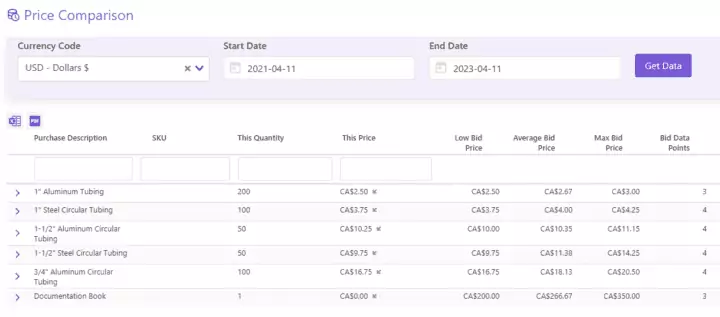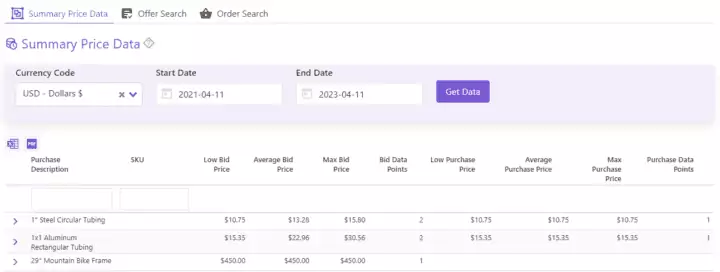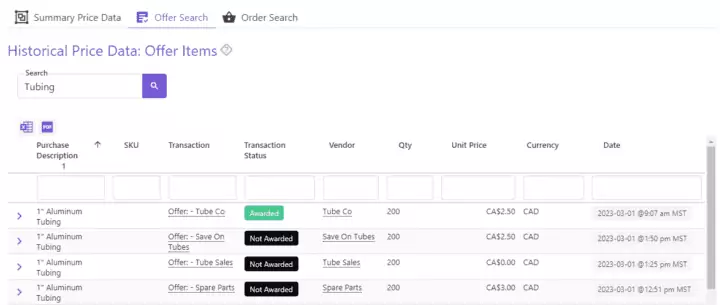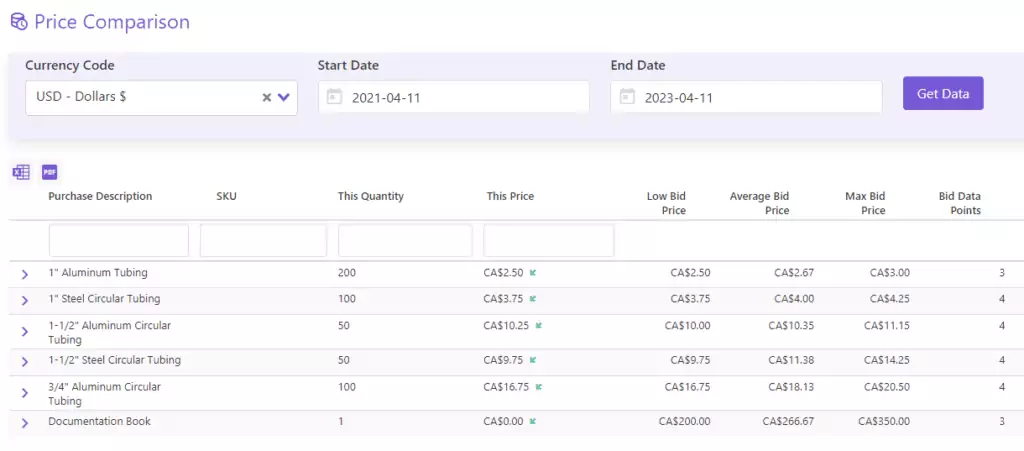The Data You Need to Make Informed Procurement Decisions
We are excited to announce we recently launched two new feature sets into Current SCM. Both leverage the wealth of historical purchasing data generated by executing your procurement processes: Offer Price Comparison and Historical Price Data, to help businesses make more informed decisions about their future purchases.
Offer Price Comparison
The Offer Price Comparison feature allows users to compare the proposed pricing from vendors against historical purchase and bid data within Current SCM. The system will automatically append historical price data to the vendor’s proposed price for each item in the bid. This data includes the low, median, and maximum price for all bids and orders within a defined period.

This feature is a valuable tool for businesses that want to make sure they are getting the best possible price for their purchases. By comparing the vendor’s proposed price to historical data, businesses can quickly identify any potential overpayments or high value offers.
Historical Purchasing Data
Summary Data
The Summary Price Data feature will provide an exportable listing of all items bid or purchased within a specified time frame with the low, median, and max price for all bids along with the same metrics for all orders. The data set can be exported to Excel and can kick off your real world estimating library.

Details By Offer
This feature allows the user to search the Catalog (using the same human-language search of our main Catalog Search function) and then list all offers towards the items within a specified time period and currency.

Details by Order
Like Details by Offer, this feature instead searches previous (or ongoing) purchases instead of bids.
How To Use This Data To Make More Informed Decisions
Buyers can utilize historical data about previous bids and purchases to make more informed decisions in a number of ways. For example, they can use this data to:
- Identifying trends in prices: By looking at how prices have changed over time, businesses can get a better sense of what a fair price is for a particular item. This can help them avoid overpaying or underpaying and tightening up cost estimates.
- Identifying the best time to buy: Businesses can use historical data to identify when prices are typically at their lowest or highest. This can help them time their purchases to get the best possible deal.
- Comparing prices from different vendors: By looking at historical data, businesses can compare prices from different sellers across multiple offers. This can help them find the best possible price for a particular item for their next bids or current negotiation.
- Identifying the best vendors: By looking at historical data, businesses can identify which vendors have a history of selling items at a fair price. This can also help them avoid sellers who are known to be consistently more expensive.
- Identifying items that are likely to appreciate: By looking at historical data, businesses can identify items that have a history of increasing in value over time. This can help them make decisions on which items might become more costly if the purchase is deferred.
Engaged in Complex Procurement?
Let’s face it, not all procurement is created equal. There’s a world of difference between ordering office supplies and purchasing materials and services with sophisticated technical requirements or managing the procurement for complex industrial projects or expediting materials from vendors across the globe.
Complex procurement demands more than standard solutions.
Current SCM is a cloud-based software-as-a-service (SaaS) that was purpose-built for complex procurement. We were born from the real-world experience of a leading industrial engineering firm who couldn’t find a procurement system that met their complex needs. So, they built their own.
Current SCM was explicitly designed to reduce errors between Engineers & Buyers by ensuring procurement professionals have access to the resources they need, including centralized procurement catalog(s), centralized procurement documentation, and centralized vendor management.
Current SCM encompasses activities that occur outside of the typical procure-to-pay process, and offers robust toolsets to support project procurement, third party procurement, technical procurement, and strategic procurement.
Current SCM provides a unified platform for procurement and materials management, offering comprehensive support for the planning, purchasing, and management of materials & services. With material and document tracking integrated into the Order and an Expediting dashboard within each Order, Current SCM provides a unique platform for Buyers and Expeditors.
And Current SCM was designed to drive collaboration among all procurement stakeholders.
Experience the difference. Contact Current SCM today to streamline your complex procurement processes.
